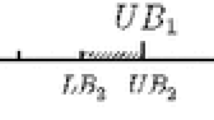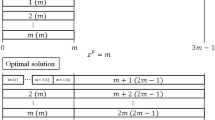Abstract
We consider the problem of off-line throughput maximization for job scheduling on one or more machines, where each job has a release time, a deadline and a profit. Most of the versions of the problem discussed here were already treated by Bar-Noy et al. (Proc. 31st ACM STOC, 1999, pp. 622–631; http://www.eng.tau.ac.il/∼amotz/). Our main contribution is to provide algorithms that do not use linear programming, are simple and much faster than the corresponding ones proposed in Bar-Noy et al. (ibid., 1999), while either having the same quality of approximation or improving it. More precisely, compared to the results of in Bar-Noy et al. (ibid., 1999), our pseudo-polynomial algorithm for multiple unrelated machines and all of our strongly-polynomial algorithms have better performance ratios, all of our algorithms run much faster, are combinatorial in nature and avoid linear programming. Finally, we show that algorithms with better performance ratios than 2 are possible if the stretch factors of the jobs are bounded; a straightforward consequence of this result is an improvement of the ratio of an optimal solution of the integer programming formulation of the JISP2 problem (see Spieksma, Journal of Scheduling, vol. 2, pp. 215–227, 1999) to its linear programming relaxation.
Similar content being viewed by others
Author information
Authors and Affiliations
Rights and permissions
About this article
Cite this article
Berman, P., Dasgupta, B. Multi-phase Algorithms for Throughput Maximization for Real-Time Scheduling. Journal of Combinatorial Optimization 4, 307–323 (2000). https://doi.org/10.1023/A:1009822211065
Issue Date:
DOI: https://doi.org/10.1023/A:1009822211065




